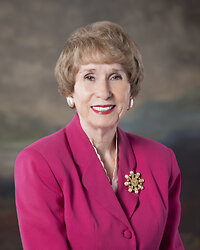Any parent who has watched their young children learn to speak knows what an exciting time it is to hear those first words. They struggle to understand what their toddler is trying to communicate. Will it be "Mama" or "Dada" or, as my first son would seem to say, "Hamburger, tu fries, Coke?" (Obviously, that last one indicated too many trips to Mcdonald's for Happy Meals.) Those early sounds became understandable words, and the world opened up to phrases and sentences. The children had adults responding to their version of communication. We didn't know what was in their minds at that particular time. It wasn't too many years before the ultimate questions of life arose. One word starts to invade every conversation: WHY?

If you have a child who asks "Why?" every single time you ask them to do something, you've likely felt frustrated. Restrain yourself from showing that frustration. Encourage the child to expand his or her world by trying to understand it. "Why?" is the question we all should ask throughout our lives. That's how we learn and grow.
Have you ever watched children in a staring contest where each one tries not to be the first one who blinks? They both struggle to deal with their watering eyes. The game is over quickly, and they turn to their parents with the "Why" question. "Why do we blink?" That is followed by years of, "Why are the clouds different shapes? Why do I have red hair? Why does a dog bark? Why do I have to eat Brussel sprouts? Why is my brother taller than me? Why does it rain in some places but not in the desert? Why should I go to kindergarten? Why should I go to college? Why is disease in the world? Why did my friend die? Why is there war?" The questions keep coming.
"Elinor Wonders Why" is a wonderful television program for young children on PBS featuring a young girl and her neighborhood friends. Each episode has them searching for the answer to a question in their community. They work together and find common-sense solutions with very little assistance from adults. A clever song in the episode I saw had the following lyrics:
"We'll find a way, find a way,
We tried again, tried again.
We didn't give up; we found a better way."
We tried again, tried again.
We didn't give up; we found a better way."
Right now, you may be thinking, "Why don't they just consult Google on their digital device and find the answer to all of those questions?" Children—and adults, too—need to develop the skill of analyzing a question and thinking through an issue. There is a time and place for Google answers. If we totally depend upon Google answers, we will limit any new scientific research and stunt the development of creative thinking.
Encourage your children to ask the "Why Questions" and then talk with them about possible answers. Adults should also ask children the "Why Questions." What a conversation that will be!
CURRENT COLUMNS
On The Front Porch With You 
Tell Me Your Storyby Rob LauerRelationships 
Creating Your Own Union Cityby Dr. Bill AustinChildren First 
Safety Firstby Becky Adams

